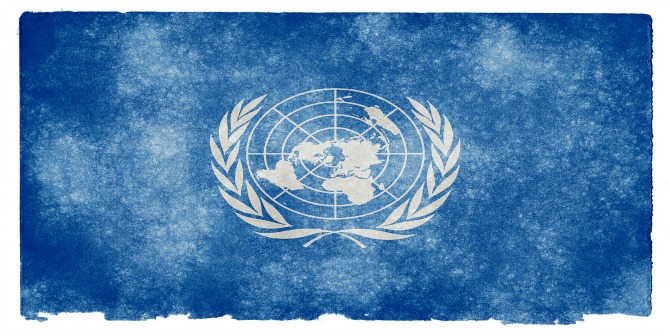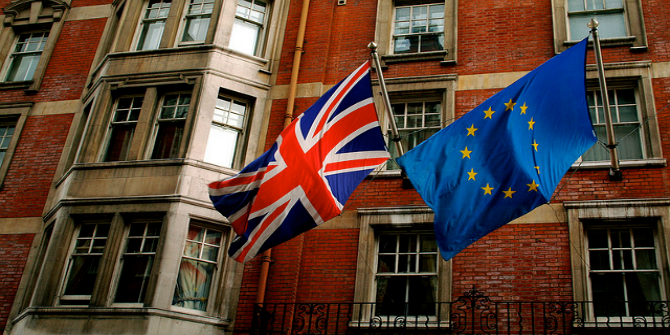 The Brexit campaign was never really about the EU or even immigration. It was about foreigners. Foreigners became a scapegoat for all the things that are not working properly – including in the NHS and in schools. But the government could not have confronted this use of xenophobia, writes Rodney Barker. Doing so would be to admit that these failures were not because of immigration but because of its own policies.
The Brexit campaign was never really about the EU or even immigration. It was about foreigners. Foreigners became a scapegoat for all the things that are not working properly – including in the NHS and in schools. But the government could not have confronted this use of xenophobia, writes Rodney Barker. Doing so would be to admit that these failures were not because of immigration but because of its own policies.
England, though not Scotland or Northern Ireland, has voted to leave the European Union. What the Remain campaign never quite realised was that Brexit, the campaign to leave, was never about the EU; it wasn’t even really about immigration; it was about foreigners. But the government’s own position was fatally compromised because it was unable to confront the use of xenophobia.
The campaigning use of immigration was to identify an enemy, exaggerated and partly imagined as enemies always are in this familiar political tactic, who could be blamed for longer waiting lists in the NHS, overcrowded class rooms in schools, reduction in public services. The government could never say these worsening of the conditions of the people were not because of immigration but because of its own old-fashioned economic liberal policy of austerity.
 So two completely different debates were being carried on, a fairly abstract debate about the economic benefits of the EU by the Remain campaign, and a scapegoating campaign against immigrants and the European Union.
So two completely different debates were being carried on, a fairly abstract debate about the economic benefits of the EU by the Remain campaign, and a scapegoating campaign against immigrants and the European Union.
What the government is now faced with is not only the economic consequences of a break with the EU, but a fracturing of the United Kingdom, with England and Wales voting one way, and Scotland and Northern Ireland voting in a completely different direction. The government has avoided, once again, taking the blame for the erosion of public services, but at the cost of the unity of its party and its country.
___
 Rodney Barker is Emeritus Professor of Government at the LSE and Emeritus Gresham Professor of Rhetoric at Gresham College.
Rodney Barker is Emeritus Professor of Government at the LSE and Emeritus Gresham Professor of Rhetoric at Gresham College.








It was basically a peasant revolt against decades of economic mismanagement by governments of the left and right alike. The geopolitics surveys are in and they say that people in the provinces don’t like having their once-thriving communities ruined by decades of criminal neglect and underinvestment. No, many of them – us – aren’t that well-educated or politically fluent. So yes, those people will lash out at anyone who they can blame for their problems. But others among us are quite well-educated, and we do have a good grasp of politics and its interaction with the global economy; of where the money flows and why; of why some people are unimaginably rich and others unimaginably poor. WE know who to blame. We know it’s not foreigners, or the people who mistakenly blame them for their problems.
http://www.bbc.co.uk/news/uk-16361170
https://i.imgur.com/6ibTPbj.jpg
Of course the campaign,&the vote,we’re about the EU. The assumption of xenophobia is principally a means of discrediting a democratic vote.It betrays it’s own ‘phobia’ against the millions who expressed a rational view that they wanted to leave.Even the EUs own figs show no turn to xenophobia around or since referendum. As for division, this sort of assertion of Xenophobia against people who had the temerity to vote Leave creates it-political divisions become entrenched, no longer open to debate.People who think differently are labelled,falsely, to justify a predetermined narrative.
Manufactured consent ..
I feel the ‘universal’ nature of Britain’s benefit system is responsible for much of the resentment felt towards foreigners. If the system were adjusted so that people could only benefit if they had contributed (as in Spain, for example) then the feeling that newcomers were pushing to the front of the queue would evaporate. Of course, a social security system based on contributions rather than rights may prove difficult to implement.
“Austerity”. What austerity? We have been running the biggest budget deficits in our peace time history. Your argument makes no sense Rodney unless you thought we should bankrupt the country.
I’ve always thought that most foreign policies conceal a great deal of xenophobia, and sometimes just plain racism. And it’s not only in the UK, I think it’s far worse for other countries like France : they’re almost going through an identity crisis because of the immigration and naturalization policies. But then again, what do I know? I’m just an immigrant (but not for long).
I just hope for UK’s sake, that BREXIT is the end of these separations and that it will not divide the UK itself. It would be sad to see. Thanks for the article.
@younessful
For me the eu debate came down to the ongoing debate between community values and rights (communitarianism) and individual values and rights (liberalism) with the eu promoting a 20/80 mix. The referendum result produced a 52/48 mix and therefore due to community rights being seen as slightly more important than individual rights we left. Consequently any brexit settlement and future UK policy should (and will) reflect this 52/48 mix of community and individual rights.
For me and viewed from this perspective, a large part of those that wished to remain were actively trying to deny brexiters their community rights by castigating them as racist and xenophobic. This verbal abuse and oppression amounted to inciting hatred and has been happening for decades in that liberals have been actively suppressing communitarians whether through verbal abuse or economic impoverishment. Now that the communitarians have won the argument and asides from a small amount of revenge politics from hard core communitarians, the liberals still seem to be trying to get their (liberal) way by trying to contest the result. What is alarming about this anti-democratic behaviour is that these same anti-democratic tendencies have been apparent throughout their period of rule, whether through the eu or during this campaign. It makes me wonder to what extremes liberals will go to try and have their liberal way.
However the result will remain and so rather than more liberalism we are now entering a period of liberal communitarianism which reflects the 52/48 result as opposed to the communitarian liberalism that reflected the 20/80 mix of eu rule.
This is what Brexiters wanted and is now what we have got – a better balance between community and individual rights and responsibilities.
Oppressed!?? Oh please do me a favour
Yep. Liberal extremism perpetrated by liberal fanatics all under the guise of liberal fascism. Roll on post-liberalism and a politics of virtue and a politics of the commom good rather than the obedience of technocratic egalitarianism.
Those among the Leave voters / Brexiters who were racist & xenophobic – and there were many – are the ones who earned the Brexiters / Leave voters that reputation. They are the ones who actively aimed to suppress the rights & voices of minorities & immigrants and those who supported them. Not all Leave voters support their views – and indeed, there are Leave voters openly condemning the racism & xenophobia of fellow Leave voters. But the fact remains that several high profile Vote Leave supporters and their followers are among those who have fanned the flames of racism & xenophobia with toxic rhetoric & policy proposals and continue to do so.
And which country constatly pushed for the 20/80? Which country was at the forefront? Now the UK is run by the opposite of what you argue. For me in fact, it is the EU’s opportunity to address issues the UK always vetoed. Those pesky social ones.
Eu treaties are negotiated by all eu member states. Some have more power than others including the uk but each country has a veto regarding treaties so every eu member state is equally responsible for 20/80.
Id say May has the 52/48 balance about right.
Ive always argued Brexit would facilitate a better EU.
The article is I feel accurate in that xenophobia has been a major factor. Driving through one of the wonderfully diverse areas of my city yesterday I was worrying about what has been unleashed and so little done from any side to stop it. If you ‘look foreign’, no matter if your family has been living here for decades, the threat to you, your family, is greater today than a few months ago – you just read Twitter to hear this. People have come to the UK because we’ve needed them and invited them, not as a colonising state power. Our economy, public services and culture are the better for this. We are in the 21st century in a globalised world and need to start behaving like it. The EU, where we were fully represented and in fact sat at the top table, is part of that world.
When you have the second biggest donor to the leave campaign, being a member of the Bnp.
And racism rife among some newspapers,the whole thing had a horribly xenophobic inevitability
if you doubt me,just look to the 1.4 million strong Facebook followers of Britain first, an entirely racist organisation, who celebrated the death of MP Jo Cox.
Dark days for Britain indeed.
PRIMARILY IT HAPPENED BECAUSE MANY FEEL BADLY SERVED BY THE SYTEM INCLUDING IMMIGRATION POLICIES BUT BOUT MUCH MORE. THIS ANOMIE WILL NOT GO AWAY BY PRETENDING NOT TO SEE IT OR WORSE STILL TO BE BLIND TO IT
” The government could never say these worsening of the conditions of the people were not because of immigration but because of its own old-fashioned economic liberal policy of austerity.”
and Jeremy Corbyn failed to drive this home.
A very old story, but so very relevant today still- the differences in attitude between INners and Outers towards immigrants confirms that at least 30% of votes were determined by xenophobia
Would you also label the independence movements of the former British colonies (ex. in India and in Africa) as being xenophobic against Brits?
I see typos… fingers on phone sorry.
The foreigners in question are the non-UK Euro-rats in Brussels who do not represent the UK citizens. The EU is no different than an Empire in which the Emperor is in a foreign land, and who pays little attention to the mere inconvenient “peasant” citizenry of the UK.
Does this article use the same inflammatory language when it described the former British colonies (whether the near East or in Africa) when they sought independence from the Empire, whose leader was in a land far far away? I doubt it.